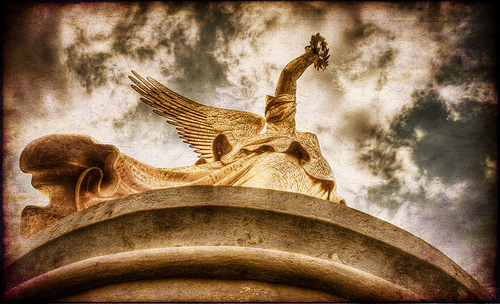 Several years ago, I was leading a workshop, and I asked the room what they thought the most important reform was to come out of the Second Vatican Council.
Several years ago, I was leading a workshop, and I asked the room what they thought the most important reform was to come out of the Second Vatican Council.
For those of us who remember the church before Vatican II, there are many choices. However, on that day, no one with gray hair raised their hand. Instead, a young woman in her 20s stood up. She said that for her, the most important thing about Vatican II is that she discovered she is called to be holy.
It is normal to be holy
I stood there for a moment thinking I had been teleported to some bizarre parallel universe in which the old people had no memory of the past and the young people were the vessels of ancient wisdom. After a minute of staring at her like she was an alien creature, I asked her how she had come to that conclusion.
“I was browsing in a bookstore,” she said, “and I came across a book about Vatican II. There was a chapter on ‘The Universal Call to Holiness.’ As I read that, I realized that holiness is not some esoteric, transcendental state for monks or the professional religious. It is an everyday way of life. It is a life that I was already living. It is a life of being in love with Jesus. I realized it is normal to be holy.”
I seriously considered just ending the workshop right then and there, because I was sure there was nothing more profound that I was going to say. As I look back, however, I wonder why those of us who lived through the council had nothing to say about the significant reforms and especially about the call to be holy.
A culture of production
Here is what I think. This may not be true for you, and that’s okay. But I think it’s true for a lot of us who started grade school before Vatican II. Pre-Vatican II, we Catholics had a culture of what I’m going to call “production.” We believed we had to strive to get to heaven. We had to produce good works—good grades, good thoughts, good families, good jobs. And we had to suppress the temptation not to produce. We had to avoid all forms of sin. Sin was anything that got in the way of us producing good works.
This was a daily battle. We would get up in the morning, set out to produce good things, and then regularly confess our failure to produce enough or our willingness to give in to temptation and sin. And there was a feeling that we were never quite successful. Only the holy people among us—monks, priests, nuns—were really able to win this daily battle.
I made the angels smile
This seems a little extreme, and we laugh a little at it now. But when I was a kid, I had a picture of life that was something close to that. I think a lot of us did. If you grew up with this culture of production, it gets into your bones. It becomes reflexive. And there is real psychological benefit to it. On the occasional good days, you feel like you really accomplished something and maybe even made God or the angels smile a little bit.
And then, some document comes out from Rome that says that kind of lifestyle is not really Catholic culture. We don’t want a culture of production. We want a culture of holiness. The way it is described by Vatican II (and by Pope Francis, by the way), is that in a culture of holiness everyone is holy. You don’t have to produce anything. Even people who give in to sin and temptation, even people who don’t believe in God, are holy.
For those of us steeped in a culture of production, this can be terrifically frustrating. We are the older brother in the Prodigal Son story. We are the vineyard workers who showed up at dawn and were paid the same as those who showed up a quitting time. Don’t we deserve better?
The secret to getting what we deserve
Some of us realized the silliness of this kind of thinking a long time ago, but I wonder if others of us are still hanging on to a small sense of entitlement. I think I am. There is a big part of me that is back-flip happy that Vatican II called us all to holiness. And there is still a little part of me—a part I’m working on—that gets up every morning to produce good works so that I can become holy. Someday.
Here is the secret that wise young woman discovered. We don’t have to do a thing to make God or the angels smile. God is laughing-out-loud-joyful that we even get up in the morning. God is as thrilled with us as a parent is with his newborn. The only thing we have to do is be thrilled back. And try to be thrilled with each other.
That is the new (ancient) culture of holiness that the Second Vatican Council called for and that Pope Francis is giving tangible example to everyday.
The challenge for RCIA teams
This matters for us as catechumenate ministers because we have a big challenge. Can we recognize if we are still hanging on to a bit of a culture of production and inadvertently passing that on to the catechumens? And if so, can learn from the older brother in the Prodigal Son story? Can we be brave enough to let go of our sense of entitlement and join the party for the younger sibling who has returned home?
What exactly does establishing a culture of holiness look like for a catechumenate process? I’d love to hear your thoughts on that. I’ll share some of mine in a future post.










Thank God for the obvious – like breathing air!
This reminds me of the same ancient wisdom that is so often missed as we look to the coming festival of the Baptism of The Lord: the tendency to look at Original Sin as more important than Original Blessing (read Original Holiness or original justice) Bob Cushing
Nick, thank you for this post on holiness. I am a “young” 74 who can identify with you on this journey of a daily transformation pf a culture of production to a culture of holiness.
Your question to all of us on which culture do we proclaim in the Catechumenate is an invitation to reflect on our own stance in life. Do I live like I have to earn or do I live believing in our God’s great desire to give. Thank you again, Nick. Happy new year to all!
Fr Bob
Who is the author of “Original Holiness or Original Justice”?
Thanks
Hi Nick, I may be reading the article wrong, but it seems to me your saying we don’t need to strive to get to heaven, that we don’t need to produce good works, that we don’t need to avoid sin, that a daily battle as a Christian is a bad thing and all people even those who don’t believe in God are holy. Would not such a view, if that’s what you are conveying, contradict the teachings of Jesus Christ and His Church?
Hi Ken. Thanks for your thoughts. Obviously, I’m not intending to contradict church teaching. I do think we need to do good and avoid sin and that we are always engaged in spiritual battle. But we cannot do any of those things without God’s grace. Everyone is filled with God’s grace, which is to say everyone is holy. So I do good works and avoid sin because God has gifted me, not so that I will earn God’s grace. It’s the motivation that matters. Pope Francis said that even atheists will go to heaven if they have sincere and contrite hearts and obey their consciences. My post was intended to reflect the pope’s teaching that God’s mercy has no limits.
I too grew up with the notion that God was watching to see what I would do with the talents He gave me and I had to strive long and hard to do my best. Over time I learned that all He wants from me is to love – love Him and love others. So simple!
Thank you, thank you, thank you. For years that was exactly what I thought was the most important thing to come out of Vatican II but I was never able to
express it as well as your young lady did. I am
“keeping” this for the next time I am “up” on presenting Vatican II at our RCIA!!!!! Great website Ken, I appreciate your sharing.
Hi Nancy. Thanks for sharing and thanks for your enthusiasm! Blessings on your ministry. —Nick